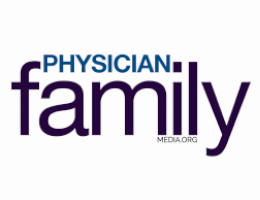Physician Burnout: Does it have another perspective in Africa?
By Dr. Yohannes Mengistu
(The drawings below have all been created by Dr. Mengistu.)

Physician burnout, as it is one of the most burning issue in the health care area worldwide, is becoming a highly sensitive focus of much research and many studies. The recent Physician Family Summer 2017 Magazine covers the topic of physician burnout, what the causes are, and how to combat, reduce and even avoid this problem, as well as addressing our own wellness.
The four top causes of burnout in the United States, as written in the “Medscape Lifestyle Report 2017,” include too many bureaucratic tasks, spending too many hours at work, feeling like just a cog in a wheel and increased computerization of medical practice. Most of these seem common to other parts of the world as well, except for electronic health records (EHRs), which are not well set into action in most African nations.
In this blog, I will try to emphasize several different aspects of causes of physician burnout in Africa, which has the same negative outcome as how burnout affects other physician on the globe.
Africa, the second largest, and second most populous continent, is a God-gifted and naturally rich continent, although we haven’t been hearing much good news on the health care front. Rising death tolls because of many disease conditions due to its dense population, limited numbers of health care professionals, institutions and medical supplies, a higher maternal and child mortality rate and all the other bad news has created a different perspective on physician burnout here in Africa.

Thus, let us see what has created this different perspective:
- The load of patients: Physicians and other health care professionals in Africa serve significant numbers of patients which is totally incomparable to their numbers. Only 1.3 percent of the world’s health workers practice in sub-Saharan Africa, although the region harbors fully 25 percent of the world’s disease. The Doctor to Patient Ratio in Africa per 100,000 people (from AfricaPaedia research in 2010), showed a relatively higher ratio in Seychelles – 151, followed by Tunisia – 134, Libia – 129, Algeria – 113, Mauritius – 106. And the lowest ratio is below ten physicians per 100,000 people in 20 African countries, with Tanzania and Malawi having only two and Ethiopia only three physicians per 100,000 people. These numbers are similar to statistical data on Density of Physicians (total number per 1000 population, latest available year) released by the World Health Organization (WHO). In addition, the limited number of institutions which provide health care, along with other health care professionals, adds up to unquantifiable levels of physician burnout in too many ways. Therefore, unless you are from Africa, it is better not to talk to an African physician about patient load.
- Disease conditions: contagiousness: Africa has been a victim and witnessed too many of her children’s deaths due to deadly and contagious disease conditions like HIV/AIDS, Cholera, Ebola, Tuberculosis, Hepatitis and others like Maternal and Child Mortality, Polio, Malaria, etc. which in part are associated with drought and famine. These case exposures and watching patients die from completely curable or preventable diseases, coupled with the scarce availability of medical supplies ranging from examination gloves to PEP (post exposure prophylaxis, for viral diseases), as well as imposing a greater risk for physicians to acquire the aforementioned conditions – all of these things can cause African health care providers to develop serious signs of burnout, like loss of joy in the practice of medicine, feeling overwhelmed and frustrated, apathy about work and colleagues and more. I read a blog on KevinMD by Jeff Kane about how doctors experience PTSD (Post Traumatic Stress Disorder) every day, and it left me wondering about how much worse it could be for African physicians?
- Who are the patients? Another important point to consider is the literacy level of patients with whom African physicians interact with every day. Although it is improving, youth literacy rates in Sub-Saharan Africa (70% in 2011) are the lowest of any region. In a direct comparison, the U.S. literacy rate is 99% while it is 59% in sub-Saharan Africa. Of the 11 countries with the lowest recorded adult literacy rates, ten are in Africa. This shows that our physicians interact with patients who have little or no idea about their own clinical conditions, who are difficult to discuss it with, to gain consent or to run investigations, from simple to more invasive ones. So, as a doctor, you’ll often have to answer completely unrelated questions raised by patients who have no idea about their own condition or investigation modalities. What makes it even more difficult is that many patients have strong beliefs from cultural, religious thinking and traditional healers which makes them distrust and go against medical advice. i.e., when the husband argues and decides for his pregnant wife, or when parents decide for their child who needs critical attention but go against a physician’s best advice. Wouldn’t this cause a physician to get burned-out?
- Salary: Physicians are relatively well-paid professionals. Although the scale differs among nations in Africa, one can expect they are paid less compared to physicians of many other nations due to the economy of the continent itself. It is not uncommon to see some burned out physicians leaving the profession for other business activities, in search of immediate well-paid income to cover their expenses and support traditionally big families. Many people have the mistaken belief that physicians are all rich, which is especially untrue in Africa. It is disappointing to be paid so much less than the great amount of work that physicians carry out, which can also contribute to physician burnout.

Therefore, as a physician in Africa, it is not only the long path gone through medical school which plays a significant role in physician burnout, but also the working environment, which is quite different from developed nations, and adds up to very high levels of stress. But there is a lot which can be done to reduce the stress and to bring out a more harmonious work environment, as well as creating inner happiness.
Although most of the causes of burnout need serious attention at the continental, government and institutional level, there are steps physicians can take to reduce stress or better cope with it. An article by Dr. Warren Holleman “When you feel overwhelmed, do a STRESS SCAN,” which appears in the recent Physician Family Magazine (www.physicianfamilymedia.org), explains many skills physicians need to develop to help them cope with stress and burnout.

Dr. Yohannes Mengistu is a sixth-year physician in training at the Bahir Dar University College of Medicine and Health Science in northwestern Ethiopia. Please note that PGY1 or intern year in the U.S. is the sixth year of medical school in Ethiopia. He has worked on the Standing Committee of Professional Exchange and served as Vice President for External Affairs for the Ethiopian Medical Students Association-Bahir Dar, a branch of the International Federation of Medical Students Association (IFMSA). Yohannes draws to relax; several of his pieces appear in this blog post. Dr. Mengistu’s work has appeared in Physician Family Magazine and the Physician Family Blog. You can contact him at guttinma@yahoo.com.
.





